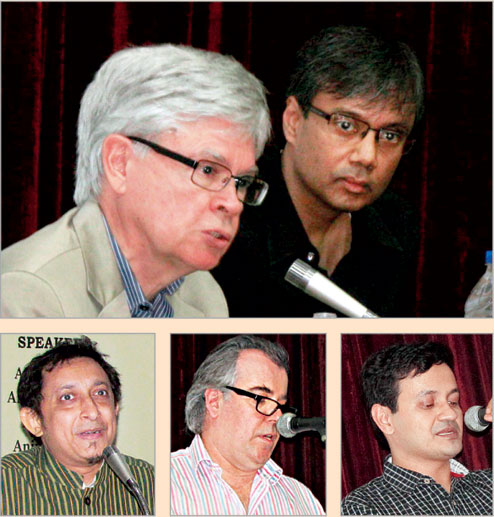 |
| (Clockwise from top) Derek Attridge, seated beside Amit Chaudhuri, delivers the inaugural UEA Infosys lecture at Jadavpur University on Tuesday; Saikat Majumdar, David Graham and Abhijit Gupta speak at the literary activism symposium |
Zoë Wicomb would have been a greatly unknown author had Professor Derek Attridge not read her.
And having read her, had he not “championed” her cause.
Attridge, who teaches in the Department of English and Related Literature at the University of York, UK, and is a Fellow of the British Academy, chanced upon Wicomb, a South African novelist whose novels are set in the apartheid-era South Africa, in the Eighties. This event of literary serendipity eventually led Attridge, from South Africa himself, to hold three conferences on Wicomb, two in Britain and one in South Africa. She went on to win the Windham-Campbell Literature Prize in 2013, which made her reach out to a wide readership from being “a writer’s writer”.
Attridge was delivering the inaugural UEA Infosys lecture, titled The Critic as Lover, at the opening session at Jadavpur University of the three-day literary activism symposium, hosted by the University of East Anglia, being held in the city. This was a good example of literary activism, especially for the many who were confused about what it meant.
Was this serendipity? What would have happened if Attridge had not “discovered” Wicomb? Speaking after the session, he said he didn’t know; probably Wicomb would have been discovered anyway. But this was the role a critic can play.
A friend had accused him of being “the critic as lover”. He had loved it.
He thinks that that’s how Jacques Derrida also wants critics to behave with literary works: not with the “hermeneutics of suspicion”. Looking at the silences within J.M. Coetzee’s novels, for example, as demeaning for some characters, as his friend thought, is not what Attridge will do. Deconstruction, he feels, Derrida reserved for philosophical works.
Love is an important word. So is passion. In the next lively session, David Graham, who was managing director of Granta Publications and before that, of Canongate Books, an independent Scottish publishing firm that published Life of Pi, the dream of a book that is a Booker-winner and a runaway best-seller in one.
Graham, now managing director of Pavilion Books, an illustrated non-fiction publishing group in the UK, boldly declared himself as “a publisher” and “a businessman” in the midst of writers and academics. “Market activism is good,” he added for good measure.
But then he spoke of the market activism of yore, of how when at Canongate Books in 2002, he took up a manuscript that had been rejected severally and, among other things, “didn’t really have an ending”. But it had blown him away. Life of Pi went on to win the Booker and has sold more than 10 million copies till date and what Graham did by way of market activism —“it is not enough to publish a book, it has to reach an audience”, he said — looked very much like literary activism.
But the market has changed drastically since then. With market success, “marketability” and Amazon.com and its ilk, the pleasure of reading has been reduced to that of the TV box set.
The last speaker, Saikat Majumdar, who teaches English at Stanford University and is the author of the novel Silverfish, discussed the role in the humanities of the “amateur”, one who educates himself outside an academic discipline, an endangered species in the age of specialisation, with particular reference to a redoubtable autodidact, Nirad C. Chaudhuri.
He regaled the audience with an interesting anecdote about Chaudhuri: how the man, while his plane was about to land in Paris, kept pointing out Paris’s streets to others. All his knowledge was from books.
The institutions, Majumdar argued, should have more room for amateurs: it would infuse pedagogy with much more life.
And love too?










